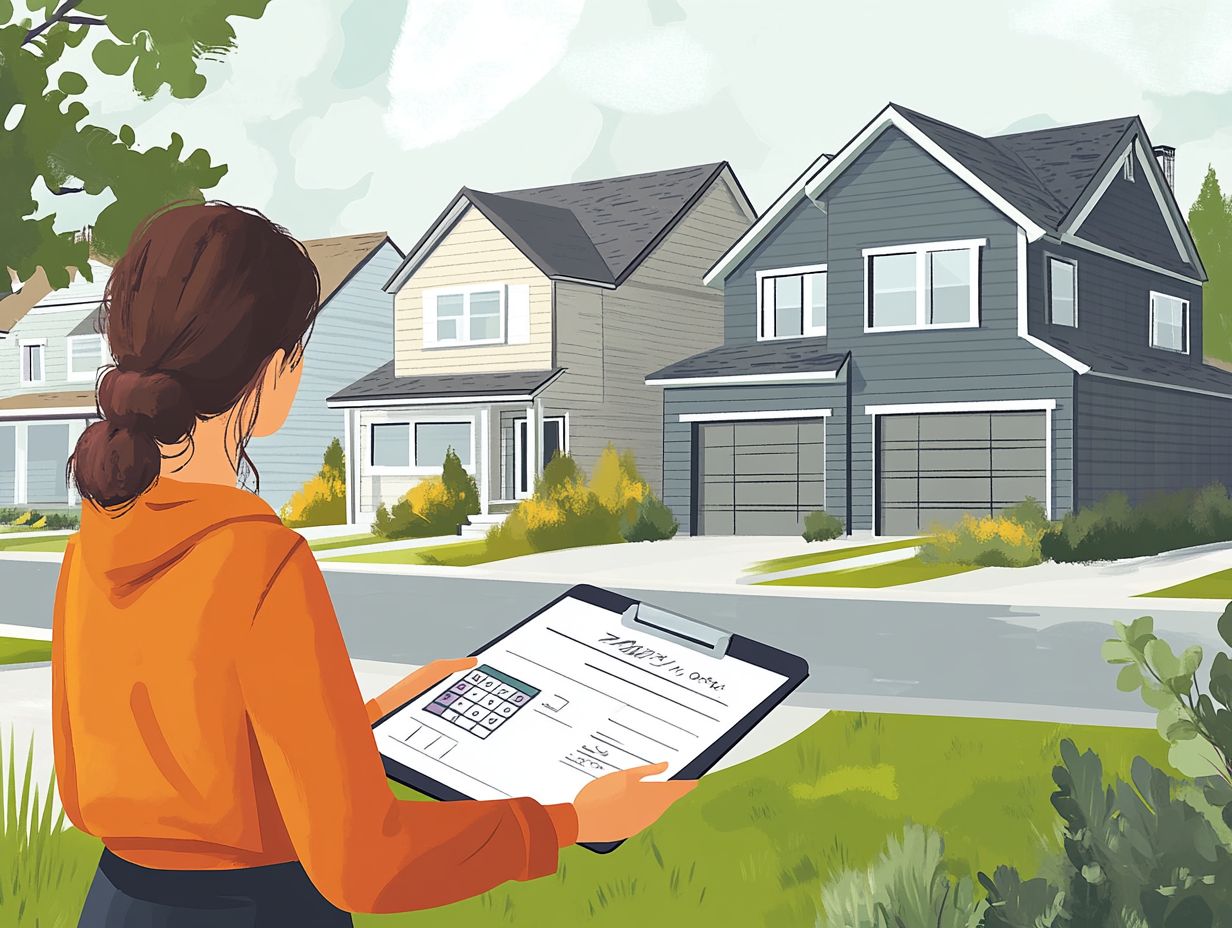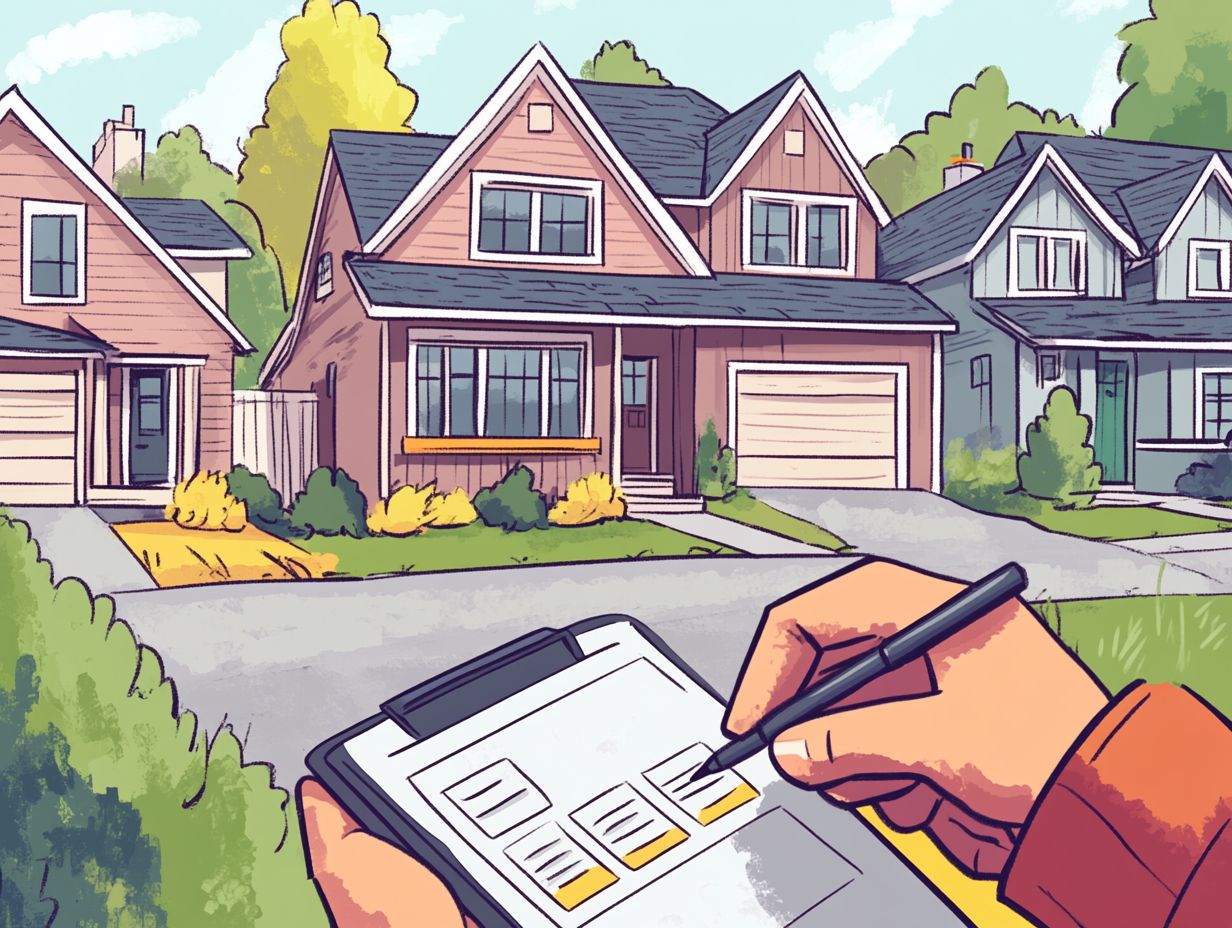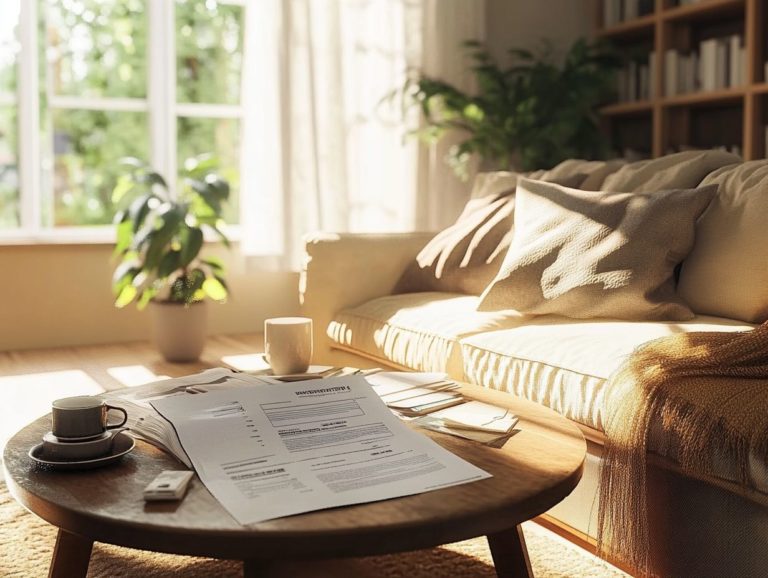How to Assess the Value of a Home
Unlock the secrets of your home’s value! Understanding home value involves several key factors. These can significantly influence a property’s market value.
From the location and condition of your property to prevailing market trends, a variety of elements influence your home’s worth. This guide explores the essential criteria that determine home value, offers methods for assessing it, and provides tips for enhancing your property s value.
Whether you’re buying, selling, or simply curious about the landscape of real estate, these insights will equip you to navigate the process with confidence.
Contents
- Key Takeaways:
- Understanding Home Value
- Factors that Affect Home Value
- Methods for Assessing Home Value
- Improving Home Value
- Resources for Home Value Assessment
- Frequently Asked Questions
- Looking to find out your home’s value? Here are some ways to do it!
- What factors can affect the value of a home?
- Can I assess the value of my home on my own?
- What is the role of an appraiser in assessing the value of a home?
- How often should I assess the value of my home?
- Will the value of my home always increase?
Key Takeaways:

Location, size, condition, and market trends are key factors that determine the value of a home.
Comparative market analysis and appraisals are effective methods for assessing the value of a home.
Investing in renovations, maintenance, and improving curb appeal can significantly increase the value of a home.
Understanding Home Value
Grasping the intricacies of home value is essential for anyone navigating the real estate market. Whether you’re looking to sell or buy, this understanding is vital.
By comprehensively understanding home value, you equip yourself to make informed decisions as a buyer. It also enables you, as a seller, to establish realistic expectations throughout the selling journey.
Familiarize yourself with terms like appraised value (what a professional thinks your home is worth), market value (what buyers are willing to pay), and estimated market value (a rough guess based on comparable sales). This knowledge can profoundly enhance your overall experience as a homeowner.
What Determines the Value of a Home?
The value of your home is shaped by a myriad of factors, including its location in a sought-after neighborhood, square footage, and overall condition.
Proximity to essential amenities such as schools, parks, and shopping centers holds significant weight in assessing your home s appeal to potential buyers. The age of the structure, recent renovations, and local market trends also affect how buyers perceive your property.
Features such as a well-maintained landscape or energy-efficient systems can enhance desirability, impacting what buyers are willing to pay.
By grasping these components, you can better position your home in the competitive real estate market, ensuring it stands out and attracts the right buyers.
Factors that Affect Home Value
Numerous factors profoundly impact home value. Understanding these elements enables you, whether a homeowner or prospective buyer, to deftly navigate the intricacies of the real estate market.
This includes staying attuned to current market trends, understanding buyer demand, and evaluating the unique characteristics of the neighborhood and the condition of the property.
Location and Neighborhood
The location of your home, especially its closeness to reputable school districts and desirable neighborhood amenities, significantly impacts its property value and buyer demand.
For many families, living near educational institutions known for their excellence is a top priority. This not only enhances their children’s learning experience but also secures a higher resale value down the line.
Neighborhoods that feature parks, shopping centers, and community services further sway buyer interest, emphasizing the need for convenience in everyday life.
Factors like public transportation accessibility and safety ratings in the area contribute to how buyers perceive a property. Ultimately, the overall environment plays a pivotal role in determining how much potential buyers are willing to invest.
Size and Condition of the Property

The size and condition of a property are paramount factors that directly influence its home value. Generally speaking, larger homes tend to command higher prices. Well-maintained homes can showcase their renovations and improvements to entice more buyer offers.
In real estate, larger square footage typically means higher value. Each extra room or bathroom can boost the home’s price. However, it s not just the dimensions that hold importance; the home s condition is equally critical.
Upgrades like modern kitchens, updated bathrooms, and energy-efficient systems significantly enhance a property’s appeal and marketability, making it more attractive to potential buyers.
A fresh coat of paint, neat landscaping, and aesthetic improvements create an inviting atmosphere, allowing the property to shine in a competitive market.
Market Trends and Demand
Market trends and buyer demand are akin to the heartbeat of home value. The ebb and flow of housing inventory and real estate prices can profoundly influence how properties are appraised in the current market landscape.
Understanding this dynamic is crucial for buyers and sellers alike! These factors not only set the stage for competition but also carry significant long-term financial implications for your property investments.
When demand surges and inventory drops, prices can skyrocket! This creates a competitive seller’s market. Conversely, an oversupply of listings without adequate buyer interest can lead to diminished valuations, underscoring the necessity of remaining attuned to local market conditions.
Thus, it s imperative for you, as a prospective homeowner or real estate professional, to closely monitor these trends to make well-informed decisions.
Methods for Assessing Home Value
Assessing the value of your home can be achieved through various methods. You might consider professional home appraisals, along with learning how to evaluate a home’s condition, which provide an expert perspective on your property’s worth.
Alternatively, a comparative market analysis by a real estate agent can give you valuable insights based on recent sales in your area.
For a more immediate option, online home value estimators are available, each offering distinct advantages in the property assessment process.
Comparative Market Analysis
A comparative market analysis (CMA) is an essential tool offered by real estate agents to assess similar homes in your local market and pinpoint the property’s market value.
This process involves a careful examination of various factors, including location, size, age, and condition of the homes, providing you with a comprehensive overview of market trends.
By scrutinizing recently sold properties, active listings, and pending sales, the CMA effectively captures the current dynamics of the real estate landscape. This insight is invaluable, as it aids sellers in pricing their homes competitively and helps buyers uncover promising investment opportunities.
Ultimately, a thorough CMA creates a transparent framework for negotiations, enabling you to make informed decisions throughout the buying and selling process.
Appraisal
A home appraisal is an expert evaluation that determines the value of a property, often required by mortgage lenders to ensure that the financing aligns with the property’s true worth during the mortgage approval process.
This systematic assessment acts as a safeguard, assuring you and the lenders that your investment accurately reflects market conditions. The appraisal involves a careful look at your property, taking into account factors like location, size, and sales of comparable properties in the area.
Unlike informal methods such as comparative market analysis, which may rely solely on recent sales data without an on-site review, a professional appraisal incorporates both quantitative metrics and qualitative observations.
This detailed approach helps establish a fair market value and protects you from potential financial pitfalls, ensuring that your transaction is transparent and equitable for everyone involved.
Improving Home Value

Enhancing the value of your home is a strategic pursuit. You can boost your home s value by making renovations. Focus on the attractiveness of your home from the street to attract potential buyers!
Home Renovations and Upgrades
Home renovations and upgrades are essential for increasing property value. Projects like kitchen remodels and bathroom improvements drive buyer demand in today s competitive housing market.
Updating key areas like the kitchen the heart of the home can provide an impressive return on investment. A well-designed kitchen with modern appliances and appealing finishes captures attention.
Bathroom upgrades also help. Incorporating energy-efficient fixtures and stylish vanities improves functionality and enhances visual allure.
Don t overlook outdoor spaces! Features like decks and beautifully landscaped gardens add charm and create an inviting atmosphere. Each enhancement you make directly correlates with increased buyer interest.
Curb Appeal and Maintenance
Curb appeal and regular maintenance are crucial for influencing your property’s value. They create an important first impression for potential buyers.
Enhancing this first impression attracts buyers and can lead to competitive offers. Simple upgrades, like a well-manicured lawn and a fresh coat of paint on the front door, significantly elevate your property’s exterior.
Routine maintenance, such as gutter cleaning and power washing, prevents larger issues, ensuring your home remains inviting and in excellent condition.
Invest a little time and effort to dramatically enhance your property s attractiveness. This will, in turn, boost its market value!
Resources for Home Value Assessment
Utilizing various resources for home value assessment offers invaluable insights, whether you’re a buyer or a seller.
Real estate agents provide expert guidance, while online tools like home value estimators deliver quick assessments. These resources help you gauge property value effectively.
Real Estate Agents and Online Tools
Real estate agents are invaluable allies for homeowners. They offer expert guidance and leverage online home value estimators for efficient property assessments.
Their deep understanding of local markets allows them to provide personalized insights that online tools might overlook. They consider neighborhood dynamics and specific property intricacies.
While online estimators can give quick estimates, they often miss nuanced analysis that seasoned professionals provide. Agents assess recent renovations and unique property characteristics.
It s essential to remember that even experienced agents can have personal biases. Online tools may yield outdated or generalized data. Adopting a balanced approach to home valuation is crucial!
Frequently Asked Questions

Looking to find out your home’s value? Here are some ways to do it!
There are several ways to assess the value of your home: hire a professional appraiser, research comparable properties, or determine your home’s value using online valuation tools.
What factors can affect the value of a home?
Yes, several factors impact the value of a home, including location, size, condition, recent renovations, and the current real estate market.
Can I assess the value of my home on my own?
While you can assess your home s value on your own, seeking help from a professional appraiser or using online valuation tools is recommended for a more accurate evaluation.
Don t miss out on enhancing your home s value! Start your assessment today!
What is the role of an appraiser in assessing the value of a home?
An appraiser is a licensed expert who evaluates how much your home is worth. They look at factors like location, size, condition, and recent sales nearby.
How often should I assess the value of my home?
Check your home’s value at least once a year, especially if you plan to sell or refinance. Major renovations or shifts in the market may mean you need to assess it more often.
Will the value of my home always increase?
No, home values can go up and down based on market conditions, location, and property changes. Regularly checking your home’s value keeps you informed about how much it’s worth.






